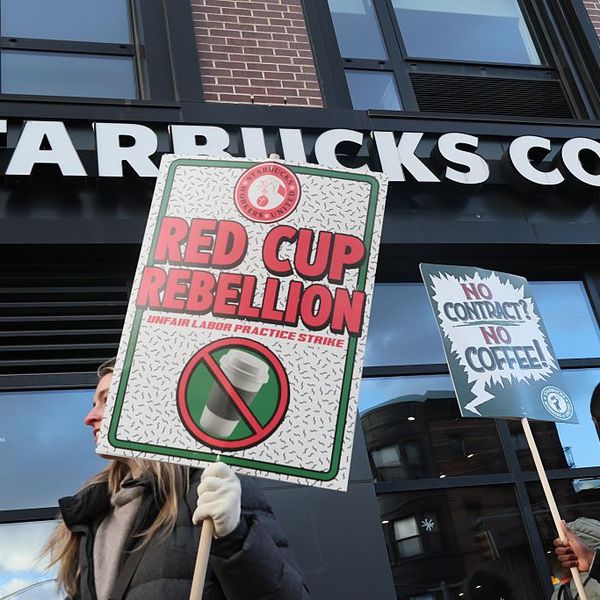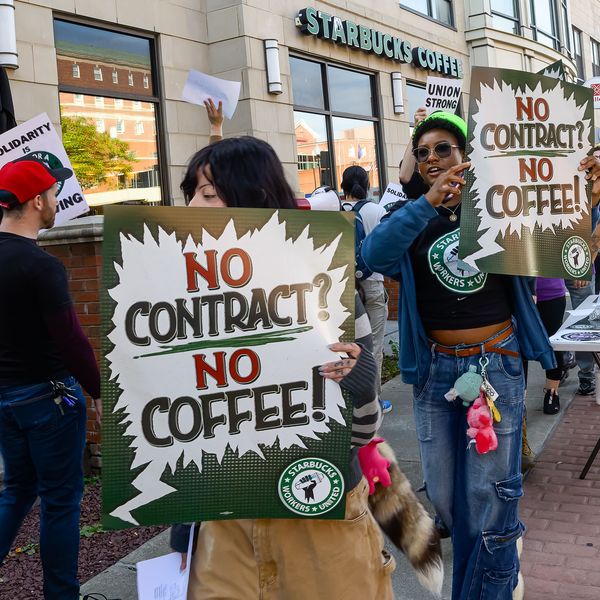In Boon to Fast Food Worker Strikes, NLRB Goes After McDonald's For "Violating Employees' Rights"
NLRB names McDonald's Corporation and several franchises as 'joint employers,' striking blow to parent company's prior efforts to side-step accountability for treatment of workers
Marking another victory for fast food workers who have staged strikes and protests across the United States, the National Labor Relations Board announced Friday it is taking joint legal action against McDonald's Corporation and several franchisees for violating employees' rights to organize.
The NLRB declared in a press release released Friday that it is issuing 13 complaints involving 78 charges of alleged wrongdoing against the fast food giant for "taking actions against [workers] for engaging in activities aimed at improving their wages and working conditions, including participating in nationwide fast food worker protests about their terms and conditions of employment during the past two years."
Violations include: "discriminatory discipline, reductions in hours, discharges, and other coercive conduct directed at employees in response to union and protected concerted activity, including threats, surveillance, interrogations, promises of benefit, and overbroad restrictions on communicating with union representatives or with other employees about unions and the employees' terms and conditions of employment," the NLRB states.
The NLRB, furthermore, notes that it is treating McDonald's and its franchisees as "joint employers"--striking a blow to the previous efforts of the parent corporation to dodge liability for how its restaurants treat workers.
The charges emerged from a growing fast food worker movement, which has organized rolling strikes and protests across the United States and world demanding a $15 dollar minimum wage and the right to organize. Workers have repeatedly called for McDonald's to be held directly accountable for labor violations and poverty wages at franchises.
According to Michael Wasser, writing for Jobs With Justice, the NLRB's joint employer classification "is a big deal."
"We know McDonald's sets rigorous operating standards for its franchisees, from menus, to uniforms, to employment practices," writes Wasser. "And we know that they monitor and enforce those standards at the corporate level. McDonald's therefore shouldn't be able to walk away when those practices appear to run afoul of the law."
McDonald's immediately released a statement saying it will "contest the joint employer allegations as well as the unfair labor practice charges in the proper forums."
But Micah Wissinger, an attorney who levied one of the cases on behalf of New York City McDonald's workers, said, "McDonald's and its corporate lobbyists continue to claim that the company has no responsibility for workers at its restaurants, but today's complaint underscores the obvious fact that McDonald's is the boss."
"The complaint validates what workers have been saying over and over again--that McDonald's requires franchisees to adhere to such regimented rules and regulations that there's no doubt who's really in charge," Wissinger continued.
An Urgent Message From Our Co-Founder
Dear Common Dreams reader, The U.S. is on a fast track to authoritarianism like nothing I've ever seen. Meanwhile, corporate news outlets are utterly capitulating to Trump, twisting their coverage to avoid drawing his ire while lining up to stuff cash in his pockets. That's why I believe that Common Dreams is doing the best and most consequential reporting that we've ever done. Our small but mighty team is a progressive reporting powerhouse, covering the news every day that the corporate media never will. Our mission has always been simple: To inform. To inspire. And to ignite change for the common good. Now here's the key piece that I want all our readers to understand: None of this would be possible without your financial support. That's not just some fundraising cliche. It's the absolute and literal truth. We don't accept corporate advertising and never will. We don't have a paywall because we don't think people should be blocked from critical news based on their ability to pay. Everything we do is funded by the donations of readers like you. Will you donate now to help power the nonprofit, independent reporting of Common Dreams? Thank you for being a vital member of our community. Together, we can keep independent journalism alive when it’s needed most. - Craig Brown, Co-founder |
Marking another victory for fast food workers who have staged strikes and protests across the United States, the National Labor Relations Board announced Friday it is taking joint legal action against McDonald's Corporation and several franchisees for violating employees' rights to organize.
The NLRB declared in a press release released Friday that it is issuing 13 complaints involving 78 charges of alleged wrongdoing against the fast food giant for "taking actions against [workers] for engaging in activities aimed at improving their wages and working conditions, including participating in nationwide fast food worker protests about their terms and conditions of employment during the past two years."
Violations include: "discriminatory discipline, reductions in hours, discharges, and other coercive conduct directed at employees in response to union and protected concerted activity, including threats, surveillance, interrogations, promises of benefit, and overbroad restrictions on communicating with union representatives or with other employees about unions and the employees' terms and conditions of employment," the NLRB states.
The NLRB, furthermore, notes that it is treating McDonald's and its franchisees as "joint employers"--striking a blow to the previous efforts of the parent corporation to dodge liability for how its restaurants treat workers.
The charges emerged from a growing fast food worker movement, which has organized rolling strikes and protests across the United States and world demanding a $15 dollar minimum wage and the right to organize. Workers have repeatedly called for McDonald's to be held directly accountable for labor violations and poverty wages at franchises.
According to Michael Wasser, writing for Jobs With Justice, the NLRB's joint employer classification "is a big deal."
"We know McDonald's sets rigorous operating standards for its franchisees, from menus, to uniforms, to employment practices," writes Wasser. "And we know that they monitor and enforce those standards at the corporate level. McDonald's therefore shouldn't be able to walk away when those practices appear to run afoul of the law."
McDonald's immediately released a statement saying it will "contest the joint employer allegations as well as the unfair labor practice charges in the proper forums."
But Micah Wissinger, an attorney who levied one of the cases on behalf of New York City McDonald's workers, said, "McDonald's and its corporate lobbyists continue to claim that the company has no responsibility for workers at its restaurants, but today's complaint underscores the obvious fact that McDonald's is the boss."
"The complaint validates what workers have been saying over and over again--that McDonald's requires franchisees to adhere to such regimented rules and regulations that there's no doubt who's really in charge," Wissinger continued.
Marking another victory for fast food workers who have staged strikes and protests across the United States, the National Labor Relations Board announced Friday it is taking joint legal action against McDonald's Corporation and several franchisees for violating employees' rights to organize.
The NLRB declared in a press release released Friday that it is issuing 13 complaints involving 78 charges of alleged wrongdoing against the fast food giant for "taking actions against [workers] for engaging in activities aimed at improving their wages and working conditions, including participating in nationwide fast food worker protests about their terms and conditions of employment during the past two years."
Violations include: "discriminatory discipline, reductions in hours, discharges, and other coercive conduct directed at employees in response to union and protected concerted activity, including threats, surveillance, interrogations, promises of benefit, and overbroad restrictions on communicating with union representatives or with other employees about unions and the employees' terms and conditions of employment," the NLRB states.
The NLRB, furthermore, notes that it is treating McDonald's and its franchisees as "joint employers"--striking a blow to the previous efforts of the parent corporation to dodge liability for how its restaurants treat workers.
The charges emerged from a growing fast food worker movement, which has organized rolling strikes and protests across the United States and world demanding a $15 dollar minimum wage and the right to organize. Workers have repeatedly called for McDonald's to be held directly accountable for labor violations and poverty wages at franchises.
According to Michael Wasser, writing for Jobs With Justice, the NLRB's joint employer classification "is a big deal."
"We know McDonald's sets rigorous operating standards for its franchisees, from menus, to uniforms, to employment practices," writes Wasser. "And we know that they monitor and enforce those standards at the corporate level. McDonald's therefore shouldn't be able to walk away when those practices appear to run afoul of the law."
McDonald's immediately released a statement saying it will "contest the joint employer allegations as well as the unfair labor practice charges in the proper forums."
But Micah Wissinger, an attorney who levied one of the cases on behalf of New York City McDonald's workers, said, "McDonald's and its corporate lobbyists continue to claim that the company has no responsibility for workers at its restaurants, but today's complaint underscores the obvious fact that McDonald's is the boss."
"The complaint validates what workers have been saying over and over again--that McDonald's requires franchisees to adhere to such regimented rules and regulations that there's no doubt who's really in charge," Wissinger continued.

